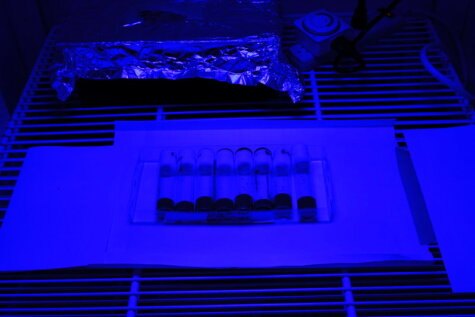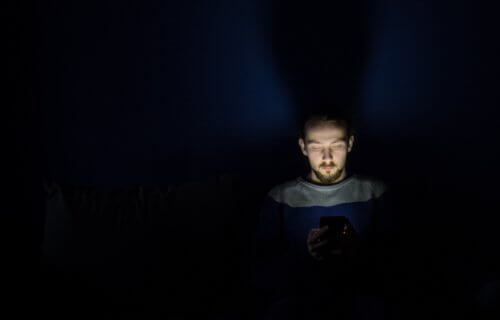CORVALLIS, Ore. — Constant exposure to blue light from phones and computers is very harmful to people. Researchers from Oregon State University say the damaging effects of daily, lifelong exposure to blue light worsen as a person ages.
Natural light is critical for a healthy circadian rhythm, which is important for a person’s eating and sleeping patterns. However, being constantly subjected to blue light disrupts sleep and causes circadian disorders. Jaga Giebultowicz, a researcher in the OSU College of Science who studies biological clocks, notes people are exposed to increasing amounts of light in the blue spectrum because LEDs emit a high fraction of blue light.
“This technology, LED lighting, even in most developed countries, has not been used long enough to know its effects across the human lifespan,” says Giebultowicz in a university release. “There are increasing concerns that extended exposure to artificial light, especially blue-enriched LED light, may be detrimental to human health. While the full effects of blue light exposure across the lifespan are not yet known in humans, accelerated aging observed in short-lived model organism should alert us to the potential of cellular damage by this stressor.”
Oregon State researchers analyzed the survival rates of common fruit flies kept in darkness and then moved at older ages to an environment of constant blue light from LEDs. The fruit fly was used because it shares cellular and developmental mechanisms with other animals, including humans.
The flies were transitioned from darkness to light at the ages of two, 20, 40 and 60 days. The study involved blue light’s effect on the mitochondria of the flies’ cells. Researchers say mitochondria act as a cell’s power plant, creating adenosine triphosphate, a chemical energy source.

Previous research showed that prolonged exposure to blue light affected flies’ longevity, including whether or not it shined in their eyes. Flies had shorter lives after being exposed to daily cycles of 12 hours in light and 12 hours in darkness, compared to flies kept in total darkness or those kept in light with blue wavelengths filtered out.
Researchers say flies had impaired locomotion because blue light damaged their retinal cells and brain neurons. They had diminished ability to climb the walls of their enclosures.
“The novel aspect of this new study is showing that chronic exposure to blue light can impair energy-producing pathways even in cells that are not specialized in sensing light,” says Giebultowicz. “We determined that specific reactions in mitochondria were dramatically reduced by blue light, while other reactions were decreased by age independent of blue light. You can think of it as blue light exposure adding insult to injury in aging flies.”
Researchers suggest, to combat blue light, people should get eyeglasses with amber lenses. This filters out blue light and protects your retinas. You can also set your phones, laptops and other devices to block blue emissions.
The study is published in Nature Partner Journals Aging.

The study appears to be primarily based on digital devices and screens, I assume there are similar affects produced by the blue light spectrum from the LED lights in our home as well. Also, in the summary, the study’s researchers suggest eyeglasses to filter out the blue light for users but the study showed that the fruit flys were affected “whether or not it shined in their eyes”. This seems to imply that eyeglasses for humans may not be a solution.
Well, if I was a fruit fly I’d turn my computer off. No human studies show retinal damage, even after cataract surgery. So I’m not buying into this blue light mania. But the guy in the Mall who works on a commission helping me pick my glasses sure sells the mania.
Humans have been exposed to blue light for billions of years. This is fake news.
It seems like the study may have been set up in a way that knowingly causes fruit flies to age that has nothing to do with blue lights. Fruit flies also see ultraviolet as well. If the energy from blue light causes brain damage the UV – which they can see – must just fry them.
This is why I stocked up on the now outlawed incandescent bulbs.